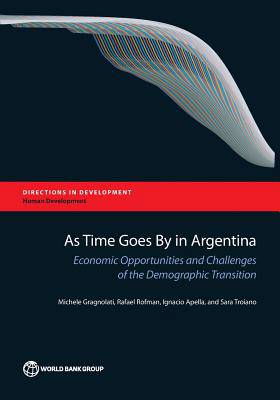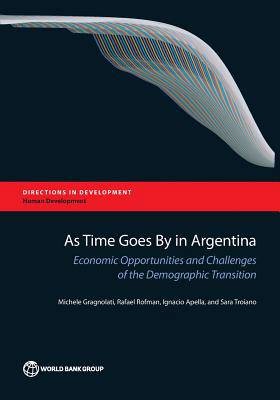
- Retrait gratuit dans votre magasin Club
- 7.000.000 titres dans notre catalogue
- Payer en toute sécurité
- Toujours un magasin près de chez vous
- Retrait gratuit dans votre magasin Club
- 7.000.0000 titres dans notre catalogue
- Payer en toute sécurité
- Toujours un magasin près de chez vous
As Time Goes By in Argentina
economic opportunities and challenges of the demographic transition
Michele Gragnolati, Rafael Rofman, Ignacio Apella
67,95 €
+ 135 points
Description
"The process of demographic transition through which Argentina is passing is a window of both opportunities and challenges in economic and social terms. Argentina is still a young country in which the working-age population represents the largest proportion of its total population. Currently, the country just began a 30-year period with the most advantageous age structure of its population, which could favor greater economic growth. This situation, known as the 'demographic window of opportunity, ' will last until the beginning of the 2040s. The dynamics of the fertility and mortality rates signify a gradual ageing of the population, with implications for various dimensions of the economy, the social protection system, public policies, and society in general. This book studies the opportunities and challenges that the demographic transition poses for the Argentine economy, its most important social sectors like the healthcare, education, and social protection systems, and the potential fiscal trade-offs that must be dealt with. The study shows that even though Argentina is moving through its demographic transition, it just recently began to enjoy the window of opportunity and this constitutes a great opportunity to achieve an accumulation of capital and future economic growth. Once the window of opportunity has passed, population ageing will have a significant impact on the level of expenditure, especially spending in the social protection system. This signifies a challenge from a fiscal policy point of view, because if long-term reforms are not undertaken to mediate these effects, the demographic transition will put pressure on the reallocation of fiscal resources among social sectors. Finally, population ageing poses concerns related to sustaining the rate of economic growth with a smaller working-age population. Taking advantage of the current window of opportunities, increasing savings that will finance the accumulation of capital, and increasing future labor force productivity in this way is a challenge for the Argentine economy."
Spécifications
Parties prenantes
- Auteur(s) :
- Editeur:
Contenu
- Nombre de pages :
- 364
- Langue:
- Anglais
- Collection :
Caractéristiques
- EAN:
- 9781464805301
- Date de parution :
- 23-04-15
- Format:
- Livre broché
- Format numérique:
- Trade paperback (VS)
- Dimensions :
- 178 mm x 254 mm
- Poids :
- 635 g

Les avis
Nous publions uniquement les avis qui respectent les conditions requises. Consultez nos conditions pour les avis.






